Nicaraguan journalists and human rights defenders denounce the Nicaraguan government’s use of violence and repression in response to public protests in a hearing before the Inter-American Commission on Human Rights
Boulder, Colorado. October 2, 2018. Journalists and human rights defenders participated in the 169th Period of Sessions of the Inter-American Commission on Human Rights (IACHR) on October 2, 2018, where they denounced the violence and repression carried out by the government of President Daniel Ortega and Vice-President Rosario Murillo in response to the social protests […]
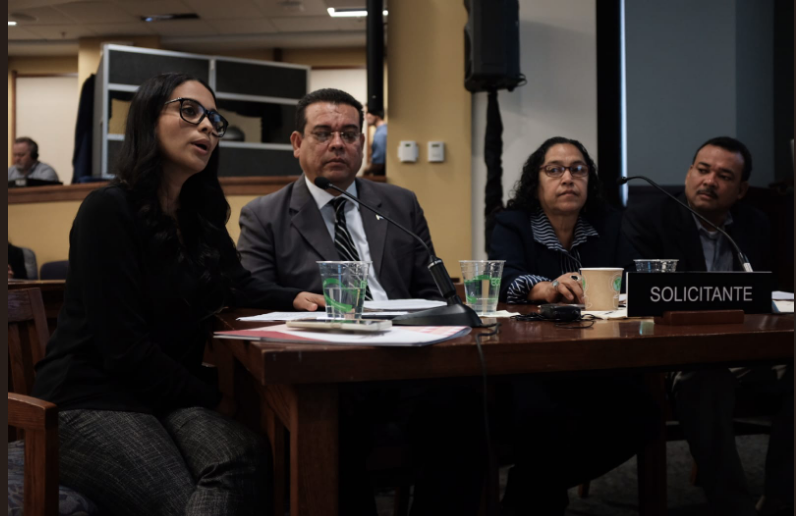
Boulder, Colorado. October 2, 2018. Journalists and human rights defenders participated in the 169th Period of Sessions of the Inter-American Commission on Human Rights (IACHR) on October 2, 2018, where they denounced the violence and repression carried out by the government of President Daniel Ortega and Vice-President Rosario Murillo in response to the social protests in Nicaragua.
Nicaragua is experiencing a grave human rights crisis that has plagued the country since April 18. Since then, the government of Daniel Ortega has used violence and repression against those who have chosen to exercise their right to peaceful protest. The situation has continued to deteriorate and public protests are now formally criminalized under a police decree issued on September 28. The decree blames public citizens for aggression and harm suffered by the police and others. The decree also prohibits public demonstrations, threatening to prosecute and convict organizers and participants. The decree adds to the climate of terror and will increase the number of political prisoners.
During the public hearing, human rights defenders and journalists described the evolution of the crisis in Nicaragua, which, according to official reports by the IACHR, has gone through distinct stages of repression and varying levels of intensity of violence towards protestors, human rights defenders, the media, and citizens in general. Additionally, grave violations of the right to freedom of expression and freedom of the press were exposed in the report. The press has been subjected to attacks, aggression, and intimidation as well as theft, persecution and censorship.
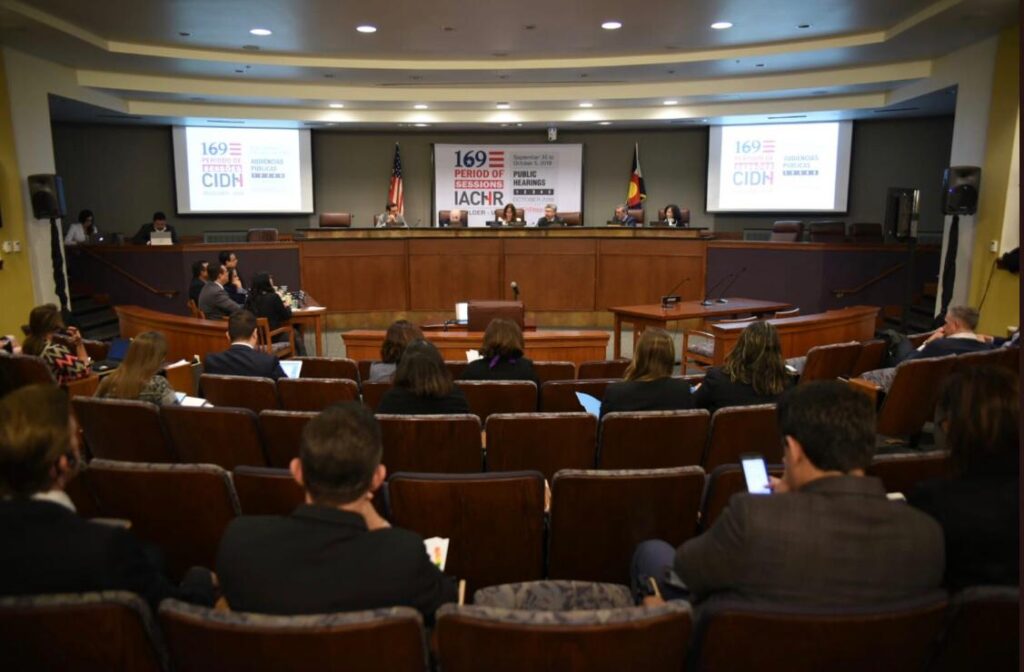
According to the report presented by Marco Carmona, member of Nicaragua’s Permanent Commission of Human Rights (CPDH, for its initials in Spanish), paramilitary and para-police groups continue to run operations in coordination with the National Police, who are responsible for more than 320 killings in the country. Of these, 5 are children, 27 are young adults, and 13 are women. Mr. Carmona stated that more than 3,000 people have been wounded and 1,500 have been arbitrarily detained, 90% of whom have been subjected to acts of torture such as beatings, electric shocks, removal of nails, and sexual violence, among other acts. “Of the 603 individuals who are still detained, only 203 have been presented before a judge and accused of grave crimes such as terrorism, illegal possession of firearms, and organized crime. These individuals have had their right to due process violated,” stated the Nicaraguan representative.
Mr. Carmona also expressed that the repression against civil society organizations has not stopped. Many activists to leave the country because they receive death threats, including those who have been granted precautionary measures by the IACHR . This reflects the current state of defenselessness of the people of Nicaragua and is a result of the increase in violence committed by those called to “protect the public order.” These state forces are attacking people who carry only blue and white flags or balloons, the colors of the Nicaraguan flag.
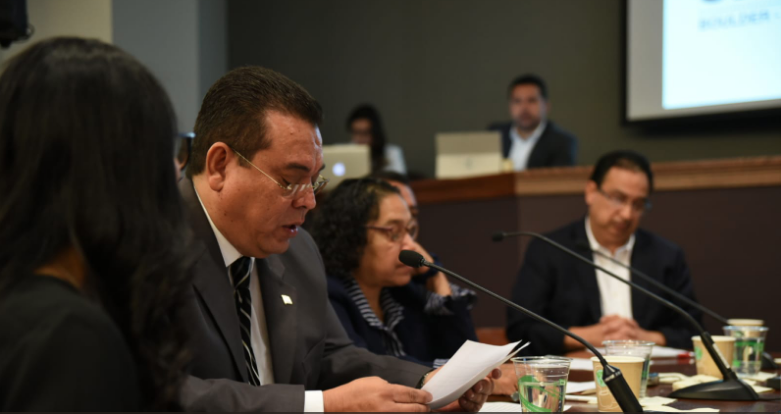
Patricia Orozco, a journalist and representative of the independent Nicaraguan radio station Onda Local, stated in her presentation that exercising freedom of expression and freedom of the press, as is the legitimate right of journalists, is now considered a crime by the Ortega government if the messages expressed do not align with its dictatorial politics. She testified that “independent media has not been able to escape the terror policy of the government. Local radio stations are especially vulnerable because they are harassed by the police and paramilitaries for reporting on what is happening.”
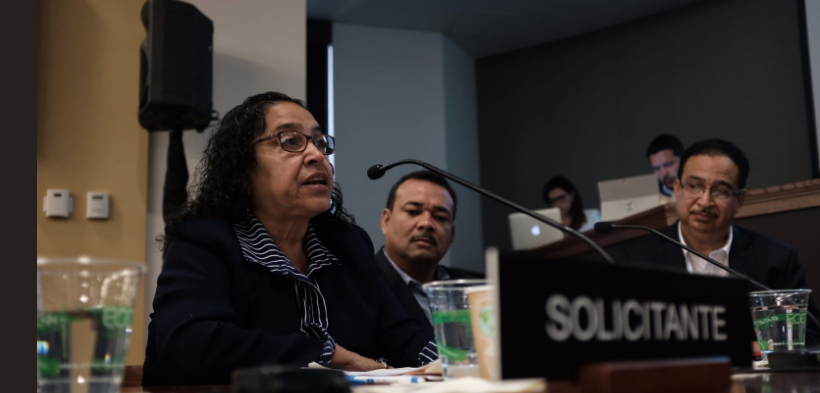
In light of the information presented, Commissioner Joel Hernandez, Rapporteur on the Rights of Persons Deprived of Liberty, lamented the absence of the Nicaraguan State at the hearing and their lack of political will to hold a dialogue, as well as the ongoing conflict in the country. He also stated with great concern that the attacks against independent journalists and the media constitutes a fourth stage of the government’s repression.
Commissioner Hernandez also mentioned that the IACHR conducted a recent visit to the country, which the national government did not participate in. During the visit, testimonies from representatives of civil society organizations were collected. These testimonies revealed that political prisoners are facing difficult conditions in prisons and detention centers. Additionally, Commissioner Hernández also stated that the judiciary to better scrutinize charges of terrorism, especially given that the factor in the definition of this crime which relates to “disturbance of the constitutional order” is highly subjective and does not form part of international practices to suppress terrorism.
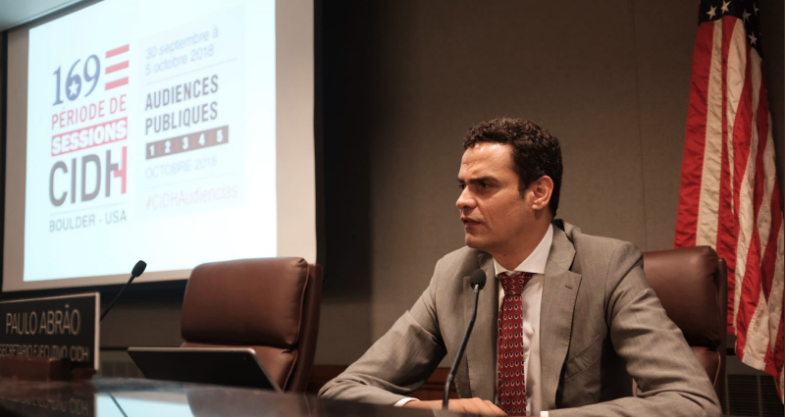
Executive Secretary of the IACHR Paulo Abrão expressed concern that the Nicaraguan state seems to be doing away with procedural rights and protections guaranteed under the rule of law and instead acting as if it is in a State of Exception, where certain rights are not respected. Secretary Abrão indicated that the way to prevent the State of Exception from becoming the norm is to respect judicial independence. Judges should denounce abuse of power by the police and rule against arbitrary detentions, which is currently not happening.
Sergio León, director of “La Costeñísima” testified that he is a victim of constant threats because of his work and that it is a great risk to be a journalist in Nicaragua, particularly in the areas of the Caribbean where journalist Ángel Gahona was murdered. Two young Afro-descendants were prosecuted and convicted for this crime under an inconsistent judicial process. Responding to this information, Edison Lanza, Special Rapporteur for Freedom of Expression, stated that “the persecution is intensifying. The State is trying to falsify reality and cover up its use of terror by touting a narrative that does not correspond to the national context.”
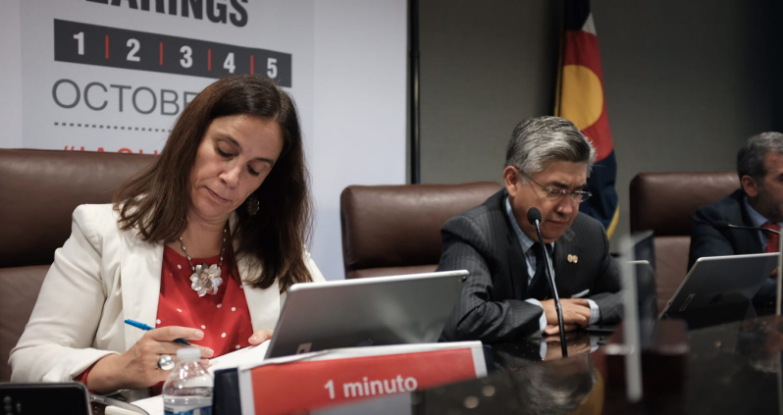
The Rapporteur for Nicaragua, Commissioner Antonia Urrejola issued an urgent call to the government of Nicaragua to not punish the activists for their participation in the hearing and stressed the need to make sure they are protected.
Representatives of civil society present at the hearing requested that the IACHR continue issuing public communications on the extreme vulnerablity of journalists and human rights defenders in the country. Furthermore, they requested that the IACHR call on the government to put an end to the repression against unarmed citizens and revoke the political decree that legally justifies the criminalization of social protests. They also requested that the IACHR pressure the government to end the harassment, intimidation, physical attacks, and censorship of journalists and members of the national and international press. The activists requested that the Nicaraguan State immediately release all political prisoners and take appropriate measures to protect journalists and human rights defenders from the risks they currently face. Finally, they asked the IACHR to work with the government in developing a protocol for the effective implementation of these protection measures.
You can see the complete hearing (in Spanish) here: https://www.youtube.com/watch?v=XECN6lLBEUU&t=2063s

